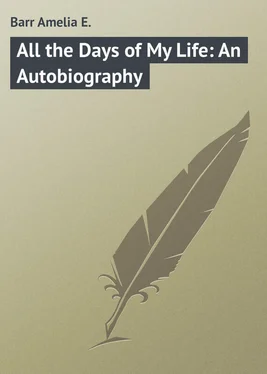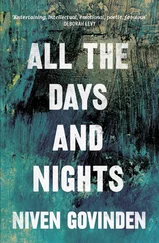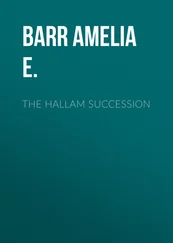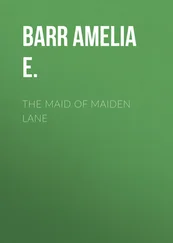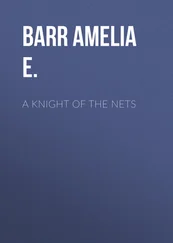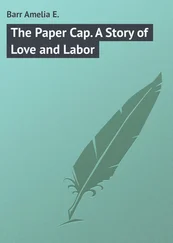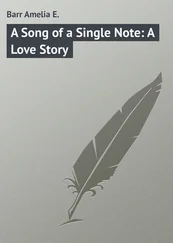Amelia Barr - All the Days of My Life - An Autobiography
Здесь есть возможность читать онлайн «Amelia Barr - All the Days of My Life - An Autobiography» — ознакомительный отрывок электронной книги совершенно бесплатно, а после прочтения отрывка купить полную версию. В некоторых случаях можно слушать аудио, скачать через торрент в формате fb2 и присутствует краткое содержание. Жанр: foreign_prose, foreign_language, на английском языке. Описание произведения, (предисловие) а так же отзывы посетителей доступны на портале библиотеки ЛибКат.
- Название:All the Days of My Life: An Autobiography
- Автор:
- Жанр:
- Год:неизвестен
- ISBN:нет данных
- Рейтинг книги:5 / 5. Голосов: 1
-
Избранное:Добавить в избранное
- Отзывы:
-
Ваша оценка:
- 100
- 1
- 2
- 3
- 4
- 5
All the Days of My Life: An Autobiography: краткое содержание, описание и аннотация
Предлагаем к чтению аннотацию, описание, краткое содержание или предисловие (зависит от того, что написал сам автор книги «All the Days of My Life: An Autobiography»). Если вы не нашли необходимую информацию о книге — напишите в комментариях, мы постараемся отыскать её.
All the Days of My Life: An Autobiography — читать онлайн ознакомительный отрывок
Ниже представлен текст книги, разбитый по страницам. Система сохранения места последней прочитанной страницы, позволяет с удобством читать онлайн бесплатно книгу «All the Days of My Life: An Autobiography», без необходимости каждый раз заново искать на чём Вы остановились. Поставьте закладку, и сможете в любой момент перейти на страницу, на которой закончили чтение.
Интервал:
Закладка:
In the day I talked to my sister of the changes Uncle’s death would make in our lives. When Christmas came, father would not permit us to go to any parties, and Jane was sure we would have to wear mourning, a kind of clothing I hated, I reminded her that the Pennants had not worn black when Mary Pennant died, and Jane reminded me that the Pennants were Quakers, and that when Frances and Eliza Pennant came back to school wearing their brown dresses, it was all the girls could manage, not to scorn them.
Of course we talked at school of our uncle, Dr. Singleton, and his expected death, and I do not understand how this circumstance imparted to us a kind of superiority, but it did. Jane put on airs, and was always on the point of crying, and I heard Laura Patterson correct the biggest pupil in the school for “speaking cross to a girl whose uncle was dying.” I dare say I had my own plan for collecting sympathy, for some of my classmates asked to walk home with me, others offered to help me with my grammer, and Adelaide Bond gave me the half of her weekly allowance of Everton toffy.
At last Mother returned home and, oh, how glad we were to see her! She came into the lighted room just as we were sitting down to supper, and an angel from heaven would not have been as welcome. My father was somewhere in the Patterdale country, where he went for a week or two at regular intervals; and, oh, how good, how glorious a thing it was, to have Mother home again!
The first thing Mother did the following day was to send for black stuff and the dressmaker. I pleaded in vain, though Mother, being of Quaker descent, was as averse to mourning dresses as I was, but she was sure Father would insist on them, because of what the Society, and people in general would say. Jane made no objections. She was very fair, and had that soft pearly complexion which is rendered more lovely by black. As for Ann, she could only look at the wastefulness of putting new dresses away in camphor for a year. She said, “Girls will grow long and lanky, and in a year the skirts will be short and narrow, and the waists too small, and the armholes too tight, and the whole business out of fashion and likelihood.”
In a few days Father came home. The girl was pipeclaying the hearth and building up the fire for the evening, and Ann laying the table for Mother’s tea as he entered. He was so delighted to find Mother at home that he said to her, “Let the girls stay and have a cup of tea with us tonight.” Then when he had set down by the fire, Jane drew her stool close to him, and I slipped on to his knee, and whispered something in his ear I shall never tell to any one. Such a happy meal followed, but little was said about Uncle Singleton. Father asked if all was well with him? Mother answered almost joyfully, “All is well!”
“Poor fellow,” continued Father. “His life was defeat from its beginning to its end.”
“No, William,” cried Mother, “at the end it was victory!” and she lifted her radiant face, and her eyes rained gladness, as she said the word “victory” with that telling upward inflection on the last syllable, common in the North Country. I can never forget either the words or the look with which they were uttered. I thought to myself, “How beautiful she is!”
I waited after tea, hoping that Mother would tell us more about Uncle’s death, but she talked of our black dresses and the bad weather, and then some neighbors came in, and I went upstairs to Ann. She had one of those high peaked sugar loaves before her, and was removing the thick dark purple paper in which they were always wrapped. The big sugar nippers were at her side, and I knew she was going to nip sugar for the next day’s use. It was, however, a kind of work it was pleasant to loiter over, and after talking awhile Ann said, “What did Mrs. Huddleston say about her brother?” Then I repeated what Mother said, and involuntarily tried to imitate her look and the tones of her voice. Ann asked if that was all, and I answered, “Yes.” Then I said, “Was he a bad man, Ann, or a good man, tell me;” and she said, “He was bad and good, like the rest of men. Don’t ask me any questions. Your mother will tell you all about him when the right time comes.”
And the right time did not come until eleven years afterwards.
In a week our dresses were ready, and we went back to school. We met with great sympathy. Jane looked beautiful, and received the attentions shown her with graceful resignation. I looked unlike myself, and felt as if I had somebody’s else frock on. But I had a happy heart, ready to make the best of any trouble, beside I knew I was unreasonable, since Ann, who was generally on my side, told me that I ought to be thankful I had any dress at all to wear, and so many nicer little girls than myself without one to put on their backs. And as for color, one color was just as good as another.
That was not true in my case, but I knew that it was no use telling Ann that story. Yet it is a fact, that I am, and have always been powerfully affected both by color and smell – the latter’s influence having a psychical or spiritual tendency. But how could I explain so complex a feeling to Ann, when I could not even understand it myself?
Queen Victoria ascended the throne of England a few weeks before I went to Penrith, but she was not crowned until a year afterwards. I remember the very June day so bright and exquisite it was! The royal and loyal town of Penrith was garlanded with roses, flags were waving from every vantage point, and the musical bells of the ancient church rang without ceasing from dawn until the long summer gloaming was lost in the mid-summer night. Yet child as I was, I noticed and partly understood, the gloom and care on the faces of so many who had no heart to rejoice, and no reason to do so.
Without much explanation the story of ordinary English life at this period would be incredible to us, and I shall only revert to it at points where it touched my own life and character. Is it not all written in Knight’s and many other histories at every one’s hand? But I saw the slough of despair, of poverty and ignorance, in which the working class struggled for their morsel of bread. And the root of all their trouble was ignorance. For instance, the wealthy town of Penrith had not, when I first saw it, one National or Lancastrian school, nor yet one free school of any kind, but the little Sunday school held in the Methodist chapel two hours on Sunday afternoons. Fortunately it was the kind of Sunday school Raikes intended. There were no daintily dressed children, and fashionably attired teachers in it – not one. The pupils were semi-starved, semi-clothed, hopeless, joyless little creatures; their teachers were hard working men and women, who took from their Sabbath rest a few hours for Christ’s sake. For how could such little ones come unto Him, if there were none to show the way?
There was even at this date, 1838, villages in England without either church or school, though Methodism had swept through the land like a Pentecostal fire half a century before; and at this same time, the big cities of London, Liverpool, Manchester, Birmingham, Bristol had not one ragged school in them. A parliamentary investigation two years afterward found plenty of villages such as Dunkirk with one hundred and thirteen children, of whom only ten could read and write; and Boughton with one hundred and nineteen children, where only seven went to a school that taught writing, and thirty-two to a Sunday school. Learning and literature were not in fashion then, especially for women. Yes, indeed, it is true that I knew in my youth, many women of wealth, beautiful women who managed their large houses with splendid hospitality and were keenly alive to public affairs, who looked on books as something rather demoralizing, and likely to encroach in some way upon works more in the way of their duty. I was very often reproved for “wasting my time over a book” so that my reading had a good deal of that charm which makes forbidden fruit “so good for food, so pleasant to the eyes, so much to be desired to make one wise.”
Читать дальшеИнтервал:
Закладка:
Похожие книги на «All the Days of My Life: An Autobiography»
Представляем Вашему вниманию похожие книги на «All the Days of My Life: An Autobiography» списком для выбора. Мы отобрали схожую по названию и смыслу литературу в надежде предоставить читателям больше вариантов отыскать новые, интересные, ещё непрочитанные произведения.
Обсуждение, отзывы о книге «All the Days of My Life: An Autobiography» и просто собственные мнения читателей. Оставьте ваши комментарии, напишите, что Вы думаете о произведении, его смысле или главных героях. Укажите что конкретно понравилось, а что нет, и почему Вы так считаете.
